City public health executive director Bob McDonald said Tuesday the city has started applying for a state program allowing businesses to operate with less serious COVID-19 restrictions.
In order for a county to be eligible for the 5 Star State Certification Program, McDonald said it has to meet certain metrics.
Denver is now eligible because its met those metrics, which include having two weeks of sustained case rates dropping, a positivity rate below 10 percent or improving, and under 90 percent of ICU beds in use or declining in use. The city got a "report card" from the state's health department showing it had met those requirements.
Cases in Denver have dropped over the past several weeks, while the city's two-week positivity rate sits at 8.6 percent as of Dec. 15. At least 74 percent of ICU beds in the Denver region are in use.
Right now, Denver is under Level Red in the state's dial, which puts several restrictions on how businesses can operate. It's the second-worst level in the state's dial.
If Denver were to participate in the 5 Star program, businesses in the city and county would be allowed to apply to operate under the Level Orange level. This would mean, for example, that restaurants in Denver could allow indoor dining again.
McDonald said the local businesses could start applying for the program as early as next month.
The application process includes providing details about how the city would implement the program, who would be part of an oversight panel that determines whether a businesses qualifies, how they would ensure compliance and investigate complaints. McDonald said he will be among the people in that committee.
Mara Brosy-Wiwchar, chief of staff to the executive director of Colorado Department of Public Health and Environment, said that panel, or administrative committee, would oversee the certification process for businesses interested in applying. She said the state takes about three business days to review an application, which can come from a county or a municipality.
"The set up to that administrative committee, through your county or municipality, may take longer," Brosy-Wiwchar said. "Which is what I imagine Denver is right now balancing because they have such a robust and diverse business sectors."
Once the city gets approved for the program, local businesses would need to submit a plan outlining how they would follow the new restrictions. McDonald said the city would review the plans and conduct an inspection to determine whether a business qualifies.
McDonald is not sure how many local businesses have asked city offices about the program; Westword reported Tracks CEO and managing partner Andrew Feinstein asked City Council to consider opting into the program.
Councilmember-at-large Robin Kniech said the city has been approaching the program "backward." She has serious concerns about how allowing restaurants to reopen under the program will impact cases in the city and jeopardize Denver Public School's plan to allow in-person learning next year.
"There are many unanswered questions here, and the responsible thing would be to publicly discuss the trade off between cases rates and public health and the economic goals," Kniech said.
Kniech said the city should continue to follow science when making decisions about reopening. She cited a study released in November by South Korean researchers suggesting the coronavirus can travel farther than 6 feet under certain conditions. She noted it as an example of how COVID-19 can spread in restaurant settings and why the city should think carefully about easing restrictions on indoor dining.
She added there are equity concerns about which businesses will have the means to apply for the program if the city is approved.
Colorado did not see a spike in cases after Thanksgiving. Locally, McDonald last week credited the city's existing public health orders for helping continue a decrease in cases in the city. He said the program can't threaten the city's priorities for reopening, including allowing in-person learning for students.
"We are going to proceed with caution," McDonald said. "As we move toward this program, I want to stress this, that public health comes first and along those same lines, the city has priorities, and we need to make sure that kids can get back to school."
If numbers start trending in the wrong direction, McDonald said the city could stop the program.













